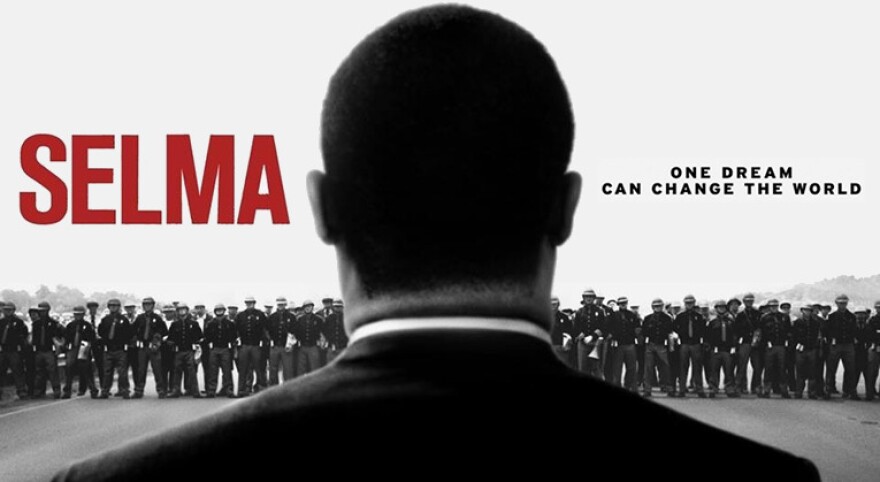With the 60th anniversary of the Selma to Montgomery march approaching, Murray State University’s Cinema International program is planning to screen the award-winning 2014 docudrama that depicts the historic Civil Rights Movement event led by Martin Luther King Jr., Hosea Williams and John Lewis in Alabama.
The marchers – who were publicly demonstrating in an effort to win voting rights for all Black Americans – faced violence from police that was broadcast on televisions across America, bringing renewed national attention to the issue.
Murray State University professor of history Brian Clardy said the film focuses on what he considers to be an iconic moment in the Civil Rights Movement. He also points out that Martin Luther King Jr. isn’t the only person profiled in the film.
“It centers on Martin Luther King Jr., obviously, but it focuses on the other characters such as Lyndon Johnson, George Wallace, Jimmie Lee Jackson. It graphically shows the murder of Jimmie Lee Jackson at one point,” said Clardy. “John Lewis is definitely featured, so you have this huge cast of characters, which gave that march in the spring of 1965 its definition in its meaning.”
Clardy said he thought MSU Cinema International featured the film because of the current political atmosphere, as well as being a selection for Black History Month.
“The fact that it's very recent, that it was well received at awards season 10 years ago, it won Best Original Song [for “Glory” by Common and John Legend],” said Clardy. “And this movie would have appeal to the larger community and to students.”
Max Duncan, a Murray State University student enrolled in Clardy’s African-American Studies course said he felt the film did a good job of depicting the police violence and repression of the marchers. He points to one particular moment in the film that resonated with him – the crossing of the Edmund Pettus Bridge.
“While watching it, I think you really get to feel how that was and what it would have been like to at least be in the area. I think it does an excellent job at depicting the tragedy and the heartbreak,” said Duncan. “The thing that got me was they're all ages. Oprah Winfrey plays a part in this movie where she ends up in a scuffle and I think it really grabs you and you think, ‘That would be my grandma. That would be someone who's 50 plus years older than me, and they still had to stand up and fight for it.’”
Another student of Clardy’s African-American Studies course, Andrew Hulsey, said he liked that the film showed the human side of the characters and does not put them up on pedestals.
“I think it does a great job of really humanizing everybody. I think a lot of biopics like this, for somebody like Martin Luther King would, make him like this perfect person, but it really shows a lot of his flaws and faults in the movie,” said Hulsey. “It makes it more real if you see it like that.”
Student Brielle Green said she felt the film portrayed activists’ frustrations with President Lyndon Johnson, who opposed the march and was trying to tame tensions between marchers and white supremacists.
“I like how the movie shows his frustration and not confidence, but most, mostly bravery, and how he pushed back against Johnson, even when he told him no, because he knew it was the right thing to do,” said Green. “I think it shows how Johnson did most of those civil rights acts to shush up Martin Luther King and shush up African Americans, because they wouldn't shut up. And they kept on marching, and they kept on saying, we need this. And he's often seen fighting with George Wallace too, because he wants to keep the peace.”
Hulsey said that the film is timely because the issues facing the activists in “Selma” are still prevalent in society, and that is why he feels it is important that people see the historic drama.
“Just learn more about American history and understand that a lot of these problems are still present today. This isn't like an over and done issue, and hopefully that inspires further acceptance and inspiration for everybody,” he said.
Clardy said he feels audiences should understand that the reaction to Bloody Sunday, when people wanted to fight back against the police and white supremacists, that the civil rights leaders went back to their roots in nonviolence.
“Andrew Young, who later became mayor of Atlanta, said, ‘We're not going to do this. We're not going to retaliate with violence, not just because of nonviolence as a social, political and even theological construct, but because if we retaliate with violence, they're going to retaliate tenfold,” said Clardy. “I want people to see the practical side, not just of Bloody Sunday, but the whole Selma to Montgomery movement, how it was put together. It did not just happen by osmosis. It happened gradually, and anything could have gone wrong at any stage of planning that event.”
MSU Cinema International is screening “Selma” Thursday, Feb. 27 and Saturday, March 1 at 7:30 p.m. in Faculty Hall room 208 on the main campus of Murray State University. Events are free and open to the public.


